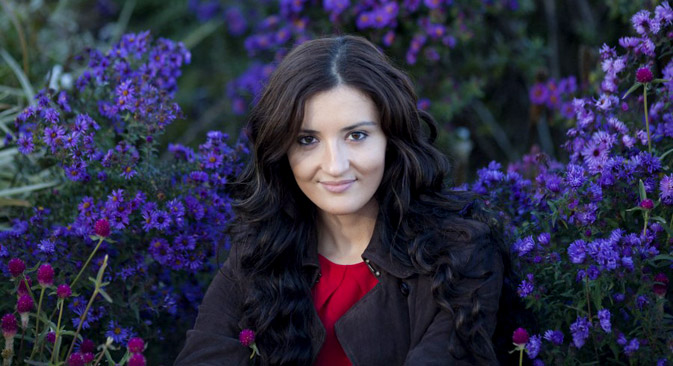
Alisa Ganieva. Source: Critik/wikipedia.org
The writer Alisa Ganieva is central to contemporary Dagestani literature. She first garnered fame – and the Debut Young Writers Prize – for her novella Salam for You, Dalgat, which she wrote under the male pseudonym Gula Khirachev. Now she has now published a new book,The Groom and the Bride, which, like her other work, is set in Dagestan.
Rossiyskaya Gazeta: You have lived in Moscow for 12 years now, but you still write about Dagestan. Why?
Alisa Ganieva: The subject matter is the same, but I'm treating it in a different way. In my previous book, A Festive Mountain, I tried to imagine what would happen if the Caucuses separated from Russia. I stress a different element in The Groom and the Bride; my protagonist was Dagestan as a whole before, but now there are specific characters.
RG: Who are some of those characters?
A.G.: The book talks about an insular village, one of those new lost types, which doesn't have any roots. It is inhabited by people who migrated there in the 50s and 60s; they do not have a mountain mentality, but they have also not adapted to the European model. By using the example of a specific village I tried to show the transformation of Dagestani society in general. The reader may think that I am writing about the traditional Caucasian way of life, about young people who are being squeezed in a vise of centuries-old conventions, about people who cannot choose their own wives or husbands or freely express their opinions. But the paradox is that this vise is not centuries old and is not intrinsic to the Caucasus.
RG: Didn’t such conventions exist in the past, then?
A.G.: Sure, authoritarianism existed in Dagestan, but it was alongside a strange, almost pagan freedom, including freedom for women. In many Dagestan regions women historically chose their husbands themselves and then managed the household. For example, men were forbidden from going out into the fields. Men could not have any interaction with anything linked to the harvest.
RG: One of the characters in your book goes onto a square
with a placard declaring that he is an agnostic. There is a scuffle and he
dies. Is it possible to live outside society’s norms in Dagestan?
A.G.: There are people in Dagestan who preserve their inner freedom and try to live counter to society's expectations. Others cannot stand the growth of obscurantism and react in an excessively shocking way: they cover themselves with tattoos, wear unconventional clothing or just become misanthropic and retreat into themselves. In contrast, others love the attention that their appearance receives. It is easy to be unusual in Dagestan: a girl just has to pick up an alcoholic cocktail or a cigarette, a man just has to grow his hair below his shoulders – and they are guaranteed attention. By doing so people survive and even achieve success. Despite the pressure of Islam, Dagestanis preserve the tolerance and heterogeneity that is characteristic of them.
RG: At the beginning of your book, the Muscovite friends of the protagonist Patya, who is from Dagestan, are amazed to learn that she is actually not a foreigner, and that Dagestan is part of Russia. Do you often encounter this way of thinking among Muscovites?
A.G.: Moscow mythologizes the Dagestanis, and the people of the Caucasus in general. Many inhabitants of the European part of Russia don’t know that Dagestan is part of their country. People used to ask me, "How come you speak Russian?" or "What’s the currency there?"
RG: Patya is considered a foreigner in Moscow, but she is also a stranger in her homeland because she has distanced herself from her roots. Do you identify with her?
A.G.: Very much so, although there is hardly anything autobiographical in the book. But it certainly contains the feeling I have that I am a foreigner everywhere. When I return to the village in the mountains where people are rather stuck in the past, I look at their lives from an outsider’s perspective. On the other hand, I realize that I must fit in, and that I can’t behave like I do in Moscow when I am back home. My speech changes subconsciously and an accent appears. A lot of people experience that.
It’s more difficult for me now because people know that I'm a writer. They’ve heard that I “disparage Dagestani life” and that I don't fear God enough. They are afraid to be themselves in front of me in case I write about them. But I’m not my real self in Moscow either. Even when they tell me, “But you're like us – no one would ever call you a churka [a derogatory word for someone from the Caucasus].”
Find the full interview in Russian at Rossiyskaya Gazeta
All rights reserved by Rossiyskaya Gazeta.
Subscribe
to our newsletter!
Get the week's best stories straight to your inbox